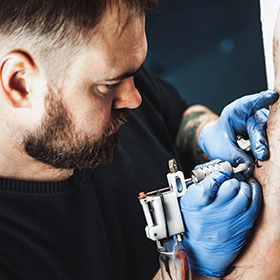Yes, Cetaphil is okay for tattoos. It is gentle and hydrating.
Many people use it for tattoo aftercare. Tattoos need proper care to heal well and look their best. The right skincare product can make a big difference. Cetaphil is a popular choice for many. It’s known for being gentle and good for sensitive skin.
But is it really the best option for your new ink? In this blog post, we will explore why Cetaphil is often recommended for tattoos. We will look at its ingredients, benefits, and potential drawbacks. This will help you decide if it’s the right choice for you and your tattoo care routine.
Introduction To Tattoo Aftercare
Taking care of a new tattoo is very important. Your tattoo needs to heal properly. This prevents infections and keeps the ink vibrant. The aftercare process starts right after you leave the tattoo shop. Clean and moisturize your tattoo daily. Avoid exposing it to the sun. Follow the artist’s advice for best results.
Importance Of Aftercare
Proper aftercare ensures your tattoo stays bright and clear. It also helps prevent infections. A well-cared-for tattoo heals faster. This reduces pain and redness. Good aftercare keeps your skin healthy. It also makes your tattoo look its best.
Common Products Used
| Product | Purpose |
|---|---|
| Antibacterial Soap | Cleans the tattoo |
| Moisturizing Lotion | Keeps skin hydrated |
| Petroleum Jelly | Protects the tattoo |
| Specialized Tattoo Cream | Speeds up healing |
Cetaphil Overview
Cetaphil is a gentle skin cleanser. It is known for its mild formula. Many people use it daily. It is free from harsh chemicals. This makes it safe for sensitive skin. Dermatologists often recommend it. It helps clean skin without drying it out.
Cetaphil is used for many skin issues. It can help with acne. Some use it to remove makeup. It is good for dry skin. Babies can also use it. People with eczema find it helpful. It is safe for daily use.
Ingredients In Cetaphil
Cetaphil contains water, glycerin, and cetyl alcohol. These keep the skin soft and hydrated. Propylene glycol helps in keeping moisture in the skin. Sodium lauryl sulfate cleans the skin by removing dirt and oil. Stearyl alcohol gives the lotion a smooth texture. The formula is free from harsh chemicals.
Cetaphil is gentle on the skin. It does not clog pores. This is good for tattoos. The product keeps the skin moist. This helps in healing. The lotion reduces dryness and itching. It is also fragrance-free, which is less likely to irritate the skin.
Cetaphil And Tattoo Healing
Cetaphil is known for its moisturizing properties. It helps keep the skin hydrated. Good hydration is key for tattoo healing. Dry skin can cause tattoos to crack and peel. Using Cetaphil can help prevent this. It is a gentle option for fresh tattoos. Many people find it soothing.
Some people have sensitive skin. Cetaphil is designed for sensitive skin. It is free from harsh chemicals. This means it is less likely to irritate a new tattoo. Keeping the skin calm is important for healing. Always do a patch test first to be sure. If there is no reaction, it is likely safe to use.
Dermatologists’ Opinions
Dermatologists often recommend Cetaphil for tattoo aftercare. Its gentle formula helps keep the skin moisturized and clean. Always consult your tattoo artist for personalized advice.
Expert Recommendations
Many dermatologists suggest using Cetaphil for tattoos. Cetaphil is gentle and suitable for sensitive skin. It helps to keep the tattoo moisturized. Dry tattoos can crack and bleed. This can cause pain and affect the tattoo’s appearance. Cetaphil’s hydrating properties help avoid these issues. It is also non-comedogenic. This means it does not clog pores. This is very important for new tattoos. Clogged pores can lead to infections.
Common Concerns
Some people worry about using Cetaphil on new tattoos. They think it might cause irritation. Most experts agree that Cetaphil is safe. It is free from harsh chemicals and fragrances. This makes it a good choice for tattoo aftercare. Always consult your tattoo artist. They can give you personal advice. Each tattoo and skin type is different. Follow their instructions for the best results.
Real User Experiences
Many people find Cetaphil good for tattoos. It keeps the skin moist. This helps in faster healing. Some users say it reduces itching. They like its gentle nature. It does not have a strong smell. Also, it is easy to find in stores. Many tattoo artists recommend it. They trust its quality. People with sensitive skin praise it too. They face fewer problems.
Not everyone loves Cetaphil for tattoos. Some users find it too greasy. It can leave a sticky feeling. A few people report breakouts. They get small pimples or rashes. Some say it does not absorb well. They prefer lighter lotions. A few users dislike its ingredients. They think it has too many chemicals. Some prefer natural products for their tattoos.
Alternative Tattoo Aftercare Products
Natural products can be great for tattoo care. Aloe vera gel is soothing and helps skin heal. Coconut oil is also a good choice. It is moisturizing and gentle. Shea butter works well too. It provides deep moisture and is safe for the skin. Calendula ointment can reduce redness and promote healing.
There are many products made just for tattoos. Tattoo Goo is popular. It helps keep tattoos bright and clear. Hustle Butter is another option. It is natural and keeps skin soft. After Inked is a vegan product. It is good for sensitive skin. Aquaphor is a trusted brand. It is often used for tattoo aftercare.
Final Verdict On Cetaphil For Tattoos
Cons:
- Can be greasy
- Not for sensitive skin
- Some find it too thick
Always test on a small area first. This helps avoid any bad reaction. Ask your tattoo artist for advice. They know what works best. Keep your tattoo clean and dry. Drink water to keep your skin healthy. Use Cetaphil in small amounts. Too much can clog pores. Do not forget to protect your tattoo from the sun.
Conclusion
Cetaphil can be a suitable option for tattoo aftercare. Its gentle formula helps keep your skin moisturized and clean. Many people have found it beneficial for their healing tattoos. Always consult your tattoo artist before using any new product. Remember, every tattoo and skin type is unique.
Proper aftercare ensures your tattoo looks its best. Take care of your ink with the right products. Your tattoo is an investment in your body art. Treat it with the respect it deserves.

